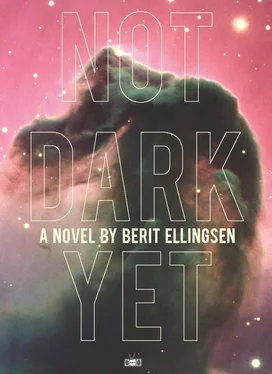Fortunately, whoever had made the purchase had wrapped and packed the gun properly. The weapon itself had been disassembled and was rolled up in a soft, dust-free cloth. The finely measured and manufactured parts glistened of oil, the barrel and chamber shiny and unused. He went through every item, cleaned and oiled them, then put them together into the whole they were meant to form, hesitating a little with the trigger mechanism for not having previous experience with the manufacturer. The scope and mount, however, was a brand he was familiar with, although the make was new to him, and they immediately clicked into place.
Beyond the shelter of the moss-covered roof, the rain fell unceasingly, creating a low hiss in the grass. He had no time to lose. The midday light was gray and even, but would soon give way to dusk. He put the ear protection muffs on, took out his phone, removed and folded his coat, and placed both next to the bag. Then he lay down prone with the rifle on the sand sock and aimed at the nearest target. There were no flags or markers up, but judging from the curtain of precipitation, the wind speed must be close to zero. He looked through the scope, its aiming reticle and dots black and clear, leaned into the stock, and relaxed. The focus and breathing technique he had been taught returned immediately. When he was comfortable he took the first shot.
A few more rounds told him that the parts were working well and made him familiar with the trigger pressure needed. He then shot to calibrate the optics at one hundred meter range, tapped the results into the phone between each shot to characterize the weapon, like a naturalist describing the individuals of a new species. After each shot he checked the lip of the barrel for the golden mark of copper traces, cleaned and oiled it, and set it to cool. When the sights were giving consistent results, he repeated the calibration and cleaning procedure at three hundred meters and then at a range of five hundred meters. The weapon and optics seemed stable and sufficient. The barrel coppered slightly, but not so much that he couldn’t get rid of it with the equipment and cleaning solution that was in the bag. He shot five series of five more rounds, letting the weapon cool after each shot, cleaning the barrel and lubricating the bolt after each series. He wondered if the rain might cease or the wind pick up as evening approached, but the droplets remained a vertical drapery and the grass stood straight and unmoving as the afternoon progressed. He cleaned the rifle again, then shot five series of five rounds each, to see how the weapon behaved when it was warm. When those results became predictable and repeatable, he made a few final shots, cleaned and oiled the rifle one last time, before he rolled it into the cloth and returned it to the bag, together with the rest of the equipment. Night had fallen and the fluorescent lamps in the roof blinked on. When he passed the table in the entryway it was empty, and he hurried to leave before anyone else appeared.
At the car he put the bag in the trunk, vomited into the grass at the edge of the gravel and spat into the vegetation. Then he started the vehicle, drove it back to the rental agency in the center of the northern city, and fetched his backpack at the train station. From there the trip on the night train south to the mountains was long and silent, and ended with him walking back from the platform to the cabin in the faint beam from the headlamp, not feeling his legs nor hands nor feet, not even the weight of the bag held close to his body.
He put the backpack and the bag in the corner of the cabin that had the least amount of water on the floor, went back outside and walked to the grove of birches that separated Eloise and Mark’s land from his. In the scattered light from the headlamp the trunks were speckled black on silver, the bark rough and grainy. The trees were slim and only a little taller than himself, kept low and humble by the altitude and wind, not like in the lowland where deciduous trees grew to three times that size. The birches even bent in the same direction as the most prevalent motion of air. The ground was covered by the leaf-fall from the birches, heart-shaped yellow, orange, and brown foliage that had survived the mild winter. He lay down, the beam from the lamp bobbing with his motions, and breathed in the fragrance of decomposition and soil, letting the earth’s moisture seep into his clothes, while earthworms, beetles, and slugs crawled over his face and hands.
INCLUDING KAYE THEY WERE SIX, STANDING ON the beach inside the night. The early spring wind was sour and chilling, but had already lost its winter teeth. He regretted not having said goodbye to Michael properly after Christmas, one last moment of tenderness between them to pretend he wasn’t the kind of person who would do what he was about to.
Kaye had texted him on the phone he’d given him in the basement of the empty house, telling him to take the train back to the city in the north where they had met, walk to a particular beach, and crush the phone on the way. It was just a few weeks since he met Kaye in the unfinished neighborhood, but it felt like years. During the time waiting in the cabin for the message he knew would come, and on the journey to that beach, he had been torn between what he thought was necessary and what he knew was right, the future and the past. As when he had first arrived at the cabin, he yearned to call Michael and flee back to the city.
He glanced at the others, thought he recognized Narayan and the blond woman from the second lecture, but wasn’t certain. He took in what he could see of their faces, the eyes and forehead and hair, trying to imagine what they looked like beneath the thin fabric of their masks. In the low illumination he couldn’t even see the shade of their eyes, whether they were light or dark, much less the color. If their features had been fully visible, he could have guessed what they looked like as children or would when they grew old, perhaps even when they were dead.
“It’s time,” Kaye said and waded into the inflatable vessel that was bobbing in the surf. The others followed. Despite the coveralls, masks, and gloves Kaye had given them, he felt naked, exposed. The engine roared to life, spewed exhaust fumes, jolted the small craft to motion. One of the four strangers startled visibly, the others remained calm and passive.
The craft kicked up sprays of seawater as it sped across the surface. The vessel had been following the beach for less than ten minutes and they were no farther than a kilometer from land, but the gleaming shore, with its weekend vacationers, surf and turf dinners, and off-season specials, seemed a million light years away.
Yet, even now the impulse to resist was strong, like pulling his hand away from a hot plate, or closing his eyes before a punch. Scenario after scenario that suggested a way, no matter how unrealistic or risky, out of the current situation, surged through his mind. The solutions offered were so tempting that his body swayed with the desired motion. For a while he defused the impulses before they could turn into action, but suddenly, he could no longer stop the urge that rose in his spine, could no longer stand the choking feeling in his throat, despite how things were and how he felt about them. In the past he had had similar doubts and not acted on them because the cost seemed too high, but now he no longer had a choice.
“I can’t do this!” he shouted over the din of the engine and the noise of the wind. “I’m sorry.”
The others turned toward him as if they were taking him in from a far distance, but the vessel didn’t slow down. He wasn’t even certain they had heard him over the motor noise and the emptiness of the water. Quickly, he leaned over the rubber side of the craft, as he had been taught to in case of emergency evacuation, but never had to do before now, curled up into a ball to protect his head and chest, and launched himself into the roaring blackness.
Читать дальше












